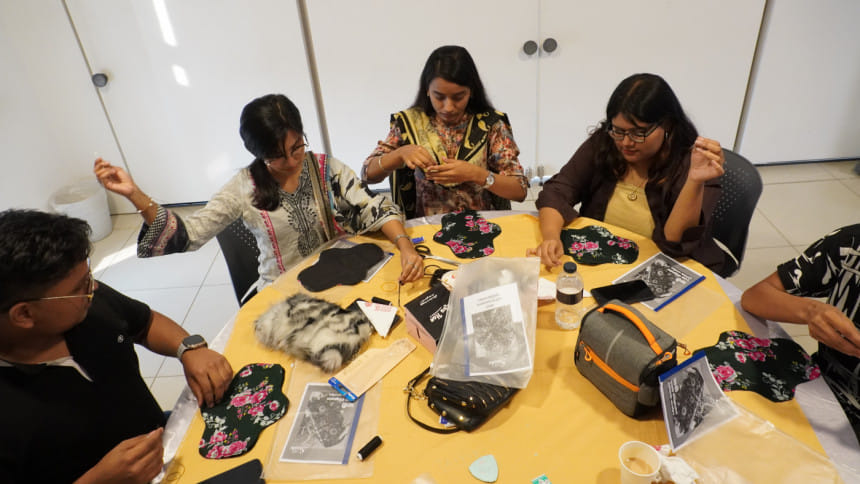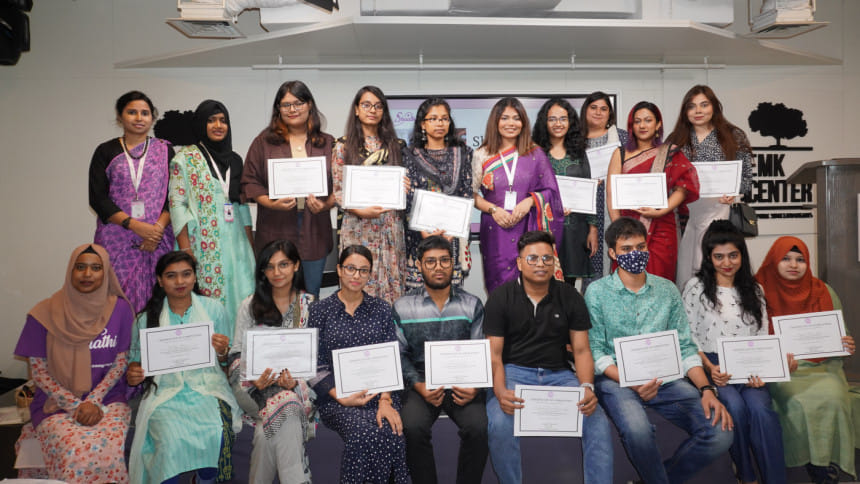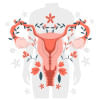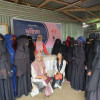Empowering change: Shaathi marks Menstrual Hygiene Day 2023 with reusable pad-making workshop

Social enterprise Shaathi Bangladesh Limited organised a workshop for making reusable pads on 28 May, 2023, on the occasion of Menstrual Hygiene Day 2023. The workshop was held at the Edward M Kennedy (EMK) Centre in Dhanmondi, Dhaka.
This year's theme of the Menstrual Hygiene Day was "Making menstruation a normal fact of life by 2030." With this in mind, the workshop, very much the first of its kind, was organised. The aim of the workshop was to empower and educate the younger generation to create positive change and promote the importance of menstrual health and hygiene management. The workshop would instil the skills, knowledge and empathy regarding period poverty and sustainable ways to manage menstrual hygiene.
Shaathi Bangladesh Limited is a social enterprise that specialises in the manufacture of reusable sanitary napkins, or pads as its more popular colloquial counterpart. They began their journey in August 2020 with the goal to eradicate period poverty, promoting menstrual health and menstrual hygiene management (MHM), make sustainable menstrual products more accessible and promote safe, eco-friendly and hygienic practices during menstruation.
In Bangladesh, it is a social taboo and stigma to discuss periods and menstruation, which is in fact, a normal bodily process that every woman goes through her whole life. Due to the stigma and lack of education regarding menstrual health, women, especially underprivileged women cannot access hygiene products and run the risk of contracting infection and other serious health complications.

According to a 2018 World Bank survey, 77 per cent have no proper access to menstrual products. 89 per cent of women in the country use rags instead of sanitary napkins. Due to stigma, many of these women cannot properly clean and dry these rags out in the open, leaving them wearing dirty rags and raising the risk of infection. Due to periods, young girls miss out on education as 40 per cent of them do not attend schools as they lack access to toilets with privacy.
Shaathi has been working to create and promote awareness among school students, madrasas, orphanages, female factory workers, sex workers and women coolies in Kamalapur railway in their fight against period poverty.
The reusable pad-making workshop was conducted in three parts with the introductory presentation done by Faria Jahan, partnership and branding officer of Shaathi Bangladesh Limited. "By hosting this reusable pad-making workshop, we are taking a step towards promoting sustainable and affordable solutions that empower women and girls to manage their menstrual health with dignity," said Faria.
Next, Dr Shiva Shahidi, medical officer of Impulse Hospital provided a visually engaging presentation on menstruation, its symptoms, abnormalities to be aware of, menstrual hygiene and nutrition needed for optimum health.
Finally, Lima Rahman, a reusable pad-making trainer, taught the 30 attendees how to hand-sew reusable pads. The pads are made using voil, flannel and silk fabrics. The pads have wings and can be fastened using buttons.
Shaathi currently has three reusable pads, Shiuli pad, Jaba pad and Shapla pad. These pads have no plastic content and harsh chemicals, making them a wonderfully eco-friendly alternative to their disposable counterparts. It is soft, comfortable, breathable and can be washed and reused for up to a year, making them highly cost-efficient for people with low incomes. These pads can reduce 200,000 metric tonnes of waste annually.
The notable projects of Shaathi include the "Give women the gift of independence", which are free workshops conducted for underprivileged women to teach them how to make reusable sanitary napkins so that they can better take care of their health while also earning money.
They have also developed a Menstrual Health and Hygiene Education (MHHE) curriculum in both Bangla and English to teach and educate young girls about menstruation and menstrual health.

 For all latest news, follow The Daily Star's Google News channel.
For all latest news, follow The Daily Star's Google News channel. 








Comments